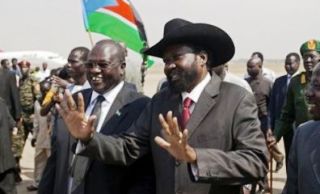S. Sudan religious leaders ask Kiir to explain move against VP Machar
April 25, 2013 (JUBA) – The most senior religious leaders in South Sudan have asked president Salva Kiir, to clarify to them the delegated powers he withdrew from the vice president, Riek Machar, as rumors of a looming crisis in the presidency continues.

The spiritual leaders’ delegation, led by the archbishop of the Catholic Church, His Lordship Paulino Lukudu Loro, held a closed door meeting with the president and his deputy on Thursday at the State House.
The delegation of the church leaders from the various denominations of Christian faith in South Sudan also included archbishop of the Episcopal Church, Daniel Deng Bul, who was recently appointed by the president to head the national reconciliation process and the moderator of the General Assembly of the Presbyterian Church, Peter Gai Lual, among others.
Abel Alier, the former president of the High Executive Council, accompanied the religious leaders to the meeting.
Speaking to the press after the meeting the Catholic Church archbishop Paulino Lukudu said they wanted to get clarifications from the president and the vice president over the decree withdrawing unspecified executive powers from Machar.
He told the press that the church leaders were disturbed by the “wild rumors” circulating in the country, particularly in the capital, Juba.
“We have been hearing that the president and the vice-president are in war, are in trouble, are in difficulties, in disagreements. This of course disturbs all of us as citizens,” lamented the top Catholic priest in the capital.
He said following the Thursday meeting with the two leaders, it became clear that the rumors were false and that the two leaders were working together peacefully.
“I want to tell you that the president is peaceful, the vice president is peaceful…There is no difference [between] them. We were even hearing that our army, our forces, our soldiers were divided. The rumors that we are hearing are not true. Our leadership is intact, they are alright, they greet themselves, they are happy,” he assured the public in a statement broadcast on state-owned SSTV and radio.
The archbishop did not, however, clarify to the press the kinds of clarifications they received from the president and his deputy over the withdrawn powers, leaving the public at the disposal of speculators.
In July 2007, Kiir issued a circular delegating “additional powers” to the vice president, Machar, putting him in charge of the implementation of the Comprehensive Peace Agreement (CPA) with the former north Sudan; overseeing the conduct of the referendum by the people of South Sudan; supervising the presidential advisors; and monitoring the activities of the independent commissions, among others.
A reliable source in the ruling party, SPLM, however told the Sudan Tribune that this recent friction between Kiir and Machar resulted from their rivalry over who should chair the party as officials gear up for the upcoming party convention to elect a flag bearer for 2015 presidential election.
A senior official in the highest executive organ of the party, the politburo, revealed that while Machar appreciated Kiir for implementation the 2005 Comprehensive Peace Agreement (CPA) and successful referendum, he also challenged the latter, criticising him for failing to guide the vision and direction of the party.
Reports compiled by the SPLM secretariats from all the ten states of the country “shockingly” revealed that the party had “lost direction and vision,” he added.
Machar also blamed Kiir for failing to navigate the country in the nation-state building by addressing, head-on, several issues including overwhelming corruption, tribalism, insecurity, economic downfall and poor international relations, etc, adding that he had a vision and program with determination to resolve these should he take the top job.
The source further added that Kiir, during the politburo meeting, denied the charges and expressed his desire to improve and therefore contest for the third term in office in the party as well as in the 2015 presidential elections until 2020.
He also expressed fear that the process leading to the party national convention may be tactically delayed unnecessarily by some undemocratic forces, or that some of the democratic procedures may be violated deliberately in an attempt to maintain the status quo.
The party holds its national convention every five years. The last convention was held in May 2008, while the next convention supposed to take place in May 2013 according to the regular schedule.
(ST)
